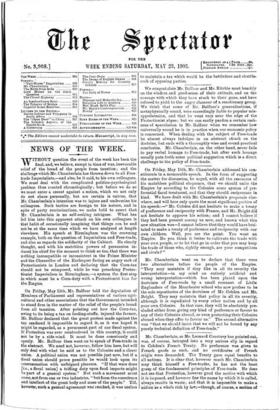Mr. Chamberlain, as Mr. Leonard Courtney has pointed out, was,
of course, betrayed into a very serious slip in regard to Cobden's French Treaty. No preference was given to French goods as such, and no certificates of French origin were demanded. The Treaty gave equal benefits to all nations. It is clear that, however much Mr. Chamberlain may think himself a Free-trader, he has not the least grasp of the fundamental principles of Free-trade. He does not see that Protection, however good the motive with which it is imposed, and however fine the name by which it is called, always results in waste; and that it is impossible to make a • uition.art a whole rich by law,,---thinigh, of course, a section of
the community may gain by interference with free exchange. Mr. Chamberlain's proposal, if carried out, would end by ruining the Empire. It would weaken it materially, and it would cause an outbreak of internal jealousy and recrimina- tion which could not but have the most disastrous results. But it will not be carried out. Nothing but force could shackle the Empire in the chains of a system of exclusive trade, and force is impossible. As we have said elsewhere, neither the Mother-country nor the Colonies are going to become a "tied house."











































 Previous page
Previous page